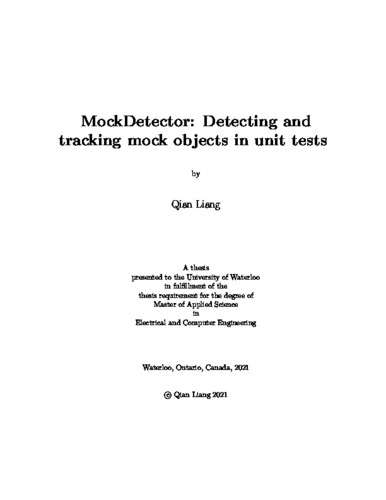| dc.description.abstract | Unit testing is a widely used tool in modern software development processes. A well-known
issue in writing tests is handling dependencies: creating usable objects for dependencies
is often complicated. Developers must therefore often introduce mock objects to
stand in for dependencies during testing.
Test suites are an increasingly important component of the source code of a software
system. We believe that the static analysis of test suites, alongside the systems under
test, can enable developers to better characterize the behaviours of existing test suites,
thus guiding further test suite analysis and manipulation. However, because mock objects
are created using reflection, they confound existing static analysis techniques. At present,
it is impossible to statically distinguish methods invoked on mock objects from methods
invoked on real objects. Static analysis tools therefore currently cannot determine which
dependencies' methods are actually tested, versus mock methods being called.
In this thesis, we introduce MockDetector, a technique to identify mock objects and
track method invocations on mock objects. We first built a Soot-based imperative dataflow
analysis implementation of MockDetector. Then, to quickly prototype new analysis features
and to explore declarative program analysis, we created a Doop-based declarative
analysis, added features to it, and ported them back to the Soot-based analysis. Both
analyses handle common Java mock libraries' APIs for creating mock objects and propagate
the mock objects information through test cases. Following our observations of
tests in the wild, we have added special-case support for arrays and collections holding
mock objects. On our suite of 8 open-source benchmarks, our imperative dataflow analysis
approach reported 2,095 invocations on mock objects intraprocedurally, whereas our
declarative dataflow approach reported 2,130 invocations on mock objects (under context-insensitive base analyses in intraprocedural mode), out of a total number of 63,017 method
invocations in test suites; across benchmarks, mock invocations accounted for a range from
0.086% to 16.4% of the total invocations. Removing confounding mock invocations from
consideration as focal methods can improve the precision of focal method analysis, a key
prerequisite to further analysis of test cases. | en |

